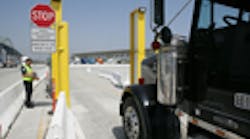The American Trucking Assns. (ATA) fired the latest salvo in the ongoing battle over the controversial truck replacement plan put into effect by the Ports of Los Angeles and Long Beach on Oct. 1.
At issue are mandates by those two ports aimed at getting drayage truckers to turn in their old equipment and upgrade to vehicles powered by either 2007-model clean diesel engines or ones using liquefied natural gas (LNG). The Ports’ Clean Truck Program (CTP) – given the full go-ahead by the ports in January – aims to cut port-related diesel truck emissions roughly 80% by requiring licensed motor carriers that service the ports to enter into drayage concession agreements that will remove high-polluting trucks from the ports.
Under the plan, the ports are granting five-year renewable concessions to carriers that comply with the CTP guidelines and pay a one-time application fee of $2,500 and fees of $100 per truck annually, the ports said.
The CTP requirements include committing to using 100% employee drivers by 2013; using trucks for drayage that meet EPA 2007 heavy-duty truck emission standards; ensuring drivers and trucks comply with driver training, vehicle maintenance, inspections and driver hours standards; registering drivers with the port’s drayage truck registry database and ensuring enrollment in the federal Transportation Worker Identification Credential (TWIC) program; and agreeing to affix radio-frequency identification devices (RFID) to vehicles.
It also mandates a $35 “clean truck fee” per loaded 20-foot equivalent container (TEU) on any truck entering a terminal in the ports with an engine model year between 1989 and 2006 – a fee collected from the beneficial cargo owner (BCO) by the terminal operator. Trucks made before 1989 won’t be allowed to operate at the ports.
ATA, however, claimed in a legal brief filed with the U.S. Court of Appeals for the Ninth Circuit on Oct. 8 that those mandated concessions and fees unlawfully re-regulate the port trucking industry. ATA is seeking an injunction against the enforcement of the CTP plan at both ports.
The trucking lobby lost an earlier court fight over this issue in August. The U.S. District Court of California decided the economic hardships port truckers may experience are outweighed by the public health benefits of the plan. According to the California Air Resources Board (CARB), pollution from ports contributes to hundreds of premature deaths annually and costs the public between $100 million and $590 million every year in healthcare costs.
While ATA said it generally supports CTP concept and the replacement of older trucks, it does not support the concessions demanded of port truckers as part of compliance – something it defines as the “illegal re-regulation of the trucking industry.”
This “further intrusion into the competitive structure of the drayage market … illustrates precisely the type of disruption of trucking services in the economy that Congress found so inefficient and disruptive,” said Bill Graves, ATA president & CEO, back in August. “Creating an artificial, non-competitive market with highly inflated costs and prices hinders our national competitive ability and sets a dangerous precedent.”
ATA noted its current legal filing is available on its website (www.truckline.com) and said Amici briefs supporting ATA will be filed by Oct. 15. The ports’ response briefs are due Nov. 5. A decision by the court could be issued as early as late November, the group added.
View more Fleet Management news and other trucking industry news from Fleet Owner.



